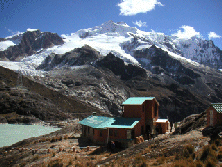Professor A R (Jo) Bradwell
Measuring Mountain Sickness
Prof. A R (Jo) Bradwell
Birmingham University Medical School
and the Birmingham Medical Research Expeditionary Society
21st February, 12 pm, A401, Engineering
Abstract
Professor Bradwell will describe the work of the Birmingham Medical Research Expeditionary Society. A summary is given below, taken from the BMRES Website www.bmres.org.uk.
BMRES was conceived in of 1976 when several young doctors including Jo Bradwell working at the Queen Elizabeth Hospital in Birmingham started climbing together. The irresistible attractions of the world's greatest mountains were tempered by lack of money. Some form of sponsorship was needed, together with a good research idea. What could be better than to investigate acute mountain sickness in a medical group undertaking a tourist trek?
The idea appealed to many people at the Hospital. Over the following spring and summer the group rapidly expanded, research projects were designed and financial support was obtained. Finally, on September 2nd, 1977, seventeen set out for Nepal and Annapurna to study the incidence of mountain sickness in themselves and to assess various biochemical changes in blood and urine.
Since then the Expeditionary Society has prospered as a medical research charity with between twenty-five and thirty subscribing members. There have been a total of nine major expeditions to the Himalayas, the Andes and Mt Kenya. On each occasion a team of 17-24 members has been taken to high altitude at sufficient speed to produce symptoms of acute mountain sickness (whilst avoiding serious illness) so that scientific observations can be made. The expeditions usually reach around 5,000 metres and large amounts of scientific equipment are taken for experimentation which is carried out over several days. Typically, between six and ten projects are undertaken simultaneously. All members of the team act as subjects and each project has a lead investigator and an assistant. Other duties such as medical officer and baggage handler are allocated as appropriate to the non-medical members whilst trekking companies are employed to make the flight and ground arrangements. In addition to the major expeditions that occur every 2-3 years there have been six minor expeditions of one week duration to high alpine huts.
Research funds have been raised from many sources including the Wellcome Trust, pharmaceutical companies and local research funds. In particular, the Arthur Thompson Trust at The Birmingham University School of Medicine has supported the participation of two or three medical students per expedition.
The main focus of the research projects have been on the clinical features and assessment of AMS, trials of drugs for prevention and treatment of AMS, cerebral oxygenation, exercise at altitude and the inhalation of various gas mixtures.
For further information on any of these seminars please contact Dr Mike Chappell 24309, mjc@eng.warwick.ac.uk.
BIRMINGHAM MEDICAL RESEARCH EXPEDITIONARY SOCIETY


